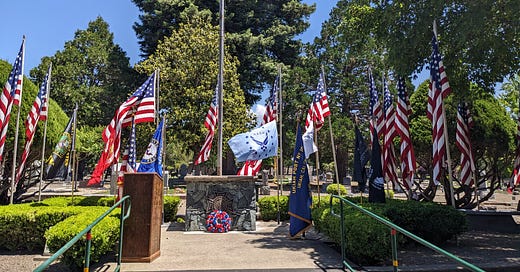Thank you for your service
I admit that I’m a veteran because it doesn’t do any good to be embarrassed about it, and people will find out eventually anyway. I thought about showing some paintings in the Veterans Day art show, but I’ve forgotten all the shibboleths, the key acronyms, and the names of all the bases where I trained.
Still, I went to the Memorial Day celebration at the local cemetery in May. There was an honor guard and a somber list of the dead and a beautiful rendition of Taps.
As the honor guard approached, the commander of the local VFW post instructed the veterans to stand and salute. “Civilians take off your hats and place your hands over your hearts,” she said kindly. It was a reminder of what is right and fitting, not an order.
I took my hat off. The honor guard approached. In the spirit of being honest about my past, I raised my right hand in a salute. Not one of these people believes I’m a veteran, I thought. I knew I was doing it wrong.
My work in the service was not particularly soldierly. I packed parachutes for the airborne school and then for the Rangers, all on Fort Benning for the full four years. It was like being a roadie for the real soldiers. We wore maroon berets, and every time we headed out to a jump, the other female riggers and I would blast “Raspberry Beret,” by the artist known at that time as Prince.
Once, we drove past a platoon of Rangers who were running along in little black short shorts and combat boots. One of my friends decided to punish them, because they were men, for the constant harassment we endured. Oddly, her punishment consisted of rolling down the window, barking at them, and making obnoxious remarks about how hot they looked. They did, but in a way that was so ridiculous, the enjoyment of watching them was more humorous than erotic.
They were confused for a second or two. Then they started cheering. They were so happy about being harassed and objectified.
She rolled up her window, entirely satisfied with what she had done. “Now they know what it feels like,” she declared.
Years later, I stood in the cool spring sunshine on the other side of the country, saluting with no hat on. I forgot if we were supposed to stop saluting at some point and then do it again, or keep saluting when the honor guard did something meaningful with the flags. Was I supposed to keep doing it while they picked up their rifles and did a ragged 21-gun salute, or was I supposed to stand at attention?
I was on so many color guards when I was in the service, because the sergeant in charge was five and a half feet tall and everyone on the color guard is supposed to be shorter than the leader. Because we had a shortage of short men, the color guard that year consisted almost entirely of women. I didn’t mind taking a break from packing parachutes to travel all over the state honoring dead veterans, but it was hard on the single mother in our group.
A lot of veterans with a more precise awareness of proprieties continue to observe the etiquette when they graduate into civilian life. Whenever I see people who are not immigrants and are under 80 years old with creases in their pants and a shine on their shoes, I suspect them of having been in the military. One of the veterans I talked to at the cemetery on Memorial Day presented me with a plastic bottle of lukewarm water and a small American flag. Little ceremonial courtesies like that have the best qualities of religion: an acknowledgement of our embodied humanity and a sign of belonging to a group together. It made it less important that I might not ever have been a real soldier; that I flubbed my attempt at being honest about my past by not behaving believably. The military awareness of symbols and passwords and ritual exceeds that of most human beings, whose use of abstract communication stops short at language. To soldiers, and to people who spent the best years of their lives as soldiers, it is incomprehensible that one of their own would let an entire culture slip away.
As I left, I complimented the bugle player, a little old guy with a white service uniform and a civilian ponytail, for his rendition of Taps. (I may have called it Reveille.) It’s one of those pieces that always gives you that proud-to-be-an-American feeling, unless the horn is out of key and the bugler is so drunk he vomits into the instrument. He looked at me like I had just exclaimed over the stunning natural beauty of a woman who is obviously wearing a wig. “It’s an insert,” he said. “You just stick it in and it plays.”



